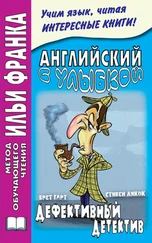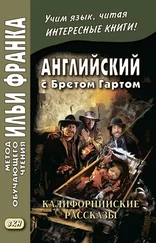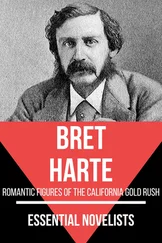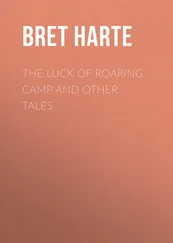Bret Harte - A First Family of Tasajara
Здесь есть возможность читать онлайн «Bret Harte - A First Family of Tasajara» — ознакомительный отрывок электронной книги совершенно бесплатно, а после прочтения отрывка купить полную версию. В некоторых случаях можно слушать аудио, скачать через торрент в формате fb2 и присутствует краткое содержание. Жанр: foreign_sf, literature_19, foreign_antique, foreign_prose, на английском языке. Описание произведения, (предисловие) а так же отзывы посетителей доступны на портале библиотеки ЛибКат.
- Название:A First Family of Tasajara
- Автор:
- Жанр:
- Год:неизвестен
- ISBN:нет данных
- Рейтинг книги:4 / 5. Голосов: 1
-
Избранное:Добавить в избранное
- Отзывы:
-
Ваша оценка:
- 80
- 1
- 2
- 3
- 4
- 5
A First Family of Tasajara: краткое содержание, описание и аннотация
Предлагаем к чтению аннотацию, описание, краткое содержание или предисловие (зависит от того, что написал сам автор книги «A First Family of Tasajara»). Если вы не нашли необходимую информацию о книге — напишите в комментариях, мы постараемся отыскать её.
A First Family of Tasajara — читать онлайн ознакомительный отрывок
Ниже представлен текст книги, разбитый по страницам. Система сохранения места последней прочитанной страницы, позволяет с удобством читать онлайн бесплатно книгу «A First Family of Tasajara», без необходимости каждый раз заново искать на чём Вы остановились. Поставьте закладку, и сможете в любой момент перейти на страницу, на которой закончили чтение.
Интервал:
Закладка:
Clear and perfectly conscious now, though frantically fighting for existence with the current, he could dimly see a floating black object shooting by the shore, at times striking the projections of the bank, until in its recoil it swung half round and drifted broadside on towards him. He was near enough to catch the frayed ends of a trailing rope that fastened the structure, which seemed to be a few logs, together. With a convulsive effort he at last gained a footing upon it, and then fell fainting along its length. It was the raft which the surveyors from the embarcadero had just abandoned.
He did not know this, nor would he have thought it otherwise strange that a raft might be a part of the drift of the overflow, even had he been entirely conscious; but his senses were failing, though he was still able to keep a secure position on the raft, and to vaguely believe that it would carry him to some relief and succor. How long he lay unconscious he never knew; in his after-recollections of that night, it seemed to have been haunted by dreams of passing dim banks and strange places; of a face and voice that had been pleasant to him; of a terror coming upon him as he appeared to be nearing a place like that home that he had abandoned in the lonely tules. He was roused at last by a violent headache, as if his soft felt hat had been changed into a tightening crown of iron. Lifting his hand to his head to tear off its covering, he was surprised to find that he was wearing no hat, but that his matted hair, stiffened and dried with blood and ooze, was clinging like a cap to his skull in the hot morning sunlight. His eyelids and lashes were glued together and weighted down by the same sanguinary plaster. He crawled to the edge of his frail raft, not without difficulty, for it oscillated and rocked strangely, and dipped his hand in the current. When he had cleared his eyes he lifted them with a shock of amazement. Creeks, banks, and plain had disappeared; he was alone on a bend of the tossing bay of San Francisco!
His first and only sense—cleared by fasting and quickened by reaction—was one of infinite relief. He was not only free from the vague terrors of the preceding days and nights, but his whole past seemed to be lost and sunk forever in this illimitable expanse. The low plain of Tasajara, with its steadfast monotony of light and shadow, had sunk beneath another level, but one that glistened, sparkled, was instinct with varying life, and moved and even danced below him. The low palisades of regularly recurring tules that had fenced in, impeded, but never relieved the blankness of his horizon, were forever swallowed up behind him. All trail of past degradation, all record of pain and suffering, all footprints of his wandering and misguided feet were smoothly wiped out in that obliterating sea. He was physically helpless, and he felt it; he was in danger, and he knew it,—but he was free!
Happily there was but little wind and the sea was slight. The raft was still intact so far as he could judge, but even in his ignorance he knew it would scarcely stand the surges of the lower bay. Like most Californians who had passed the straits of Carquinez at night in a steamer, he did not recognize the locality, nor even the distant peak of Tamalpais. There were a few dotting sails that seemed as remote, as uncertain, and as unfriendly as sea birds. The raft was motionless, almost as motionless as he was in his cramped limbs and sun-dried, stiffened clothes. Too weak to keep an upright position, without mast, stick, or oar to lift a signal above that vast expanse, it seemed impossible for him to attract attention. Even his pistol was gone.
Suddenly, in an attempt to raise himself, he was struck by a flash so blinding that it seemed to pierce his aching eyes and brain and turned him sick. It appeared to come from a crevice between the logs at the further end of the raft. Creeping painfully towards it he saw that it was a triangular slip of highly polished metal that he had hitherto overlooked. He did not know that it was a “flashing” mirror used in topographical observation, which had slipped from the surveyors’ instruments when they abandoned the raft, but his excited faculties instinctively detected its value to him. He lifted it, and, facing the sun, raised it at different angles with his feeble arms. But the effort was too much for him; the raft presently seemed to be whirling with his movement, and he again fell.
“Ahoy there!”
The voice was close upon—in his very ears. He opened his eyes. The sea still stretched emptily before him; the dotting sails still unchanged and distant. Yet a strange shadow lay upon the raft. He turned his head with difficulty. On the opposite side—so close upon him as to be almost over his head—the great white sails of a schooner hovered above him like the wings of some enormous sea bird. Then a heavy boom swung across the raft, so low that it would have swept him away had he been in an upright position; the sides of the vessel grazed the raft and she fell slowly off. A terrible fear of abandonment took possession of him; he tried to speak, but could not. The vessel moved further away, but the raft followed! He could see now it was being held by a boat-hook,—could see the odd, eager curiosity on two faces that were raised above the taffrail, and with that sense of relief his eyes again closed in unconsciousness.
A feeling of chilliness, followed by a grateful sensation of drawing closer under some warm covering, a stinging taste in his mouth of fiery liquor and the aromatic steam of hot coffee, were his first returning sensations. His head and neck were swathed in coarse bandages, and his skin stiffened and smarting with soap. He was lying in a rude berth under a half-deck from which he could see the sky and the bellying sail, and presently a bearded face filled with rough and practical concern that peered down upon him.
“Hulloo! comin’ round, eh? Hold on!” The next moment the stranger had leaped down beside Elijah. He seemed to be an odd mingling of the sailor and ranchero with the shrewdness of a seaport trader.
“Hulloo, boss! What was it? A free fight, or a wash-out?”
“A wash-out!” 1 1 A mining term for the temporary inundation of a claim by flood; also used for the sterilizing effect of flood on fertile soil.
Elijah grasped the idea as an inspiration. Yes, his cabin had been inundated, he had taken to a raft, had been knocked off twice or thrice, and had lost everything—even his revolver!
The man looked relieved. “Then it ain’t a free fight, nor havin’ your crust busted and bein’ robbed by beach combers, eh?”
“No,” said Elijah, with his first faint smile.
“Glad o’ that,” said the man bluntly. “Then thar ain’t no police business to tie up to in ‘Frisco? We were stuck thar a week once, just because we chanced to pick up a feller who’d been found gagged and then thrown overboard by wharf thieves. Had to dance attendance at court thar and lost our trip.” He stopped and looked half-pathetically at the prostrate Elijah. “Look yer! ye ain’t just dyin’ to go ashore NOW and see yer friends and send messages, are ye?”
Elijah shuddered inwardly, but outwardly smiled faintly as he replied, “No!”
“And the tide and wind jest servin’ us now, ye wouldn’t mind keepin’ straight on with us this trip?”
“Where to?” asked Elijah.
“Santy Barbara.”
“No,” said Elijah, after a moment’s pause. “I’ll go with you.”
The man leaped to his feet, lifted his head above the upper deck, shouted “Let her go free, Jerry!” and then turned gratefully to his passenger. “Look yer! A wash-out is a wash-out, I reckon, put it any way you like; it don’t put anything back into the land, or anything back into your pocket afterwards, eh? No! And yer well out of it, pardner! Now there’s a right smart chance for locatin’ jest back of Santy Barbara, where thar ain’t no God-forsaken tules to overflow; and ez far ez the land and licker lies ye ‘needn’t take any water in yours’ ef ye don’t want it. You kin start fresh thar, pardner, and brail up. What’s the matter with you, old man, is only fever ‘n’ agur ketched in them tules! I kin see it in your eyes. Now you hold on whar you be till I go forrard and see everything taut, and then I’ll come back and we’ll have a talk.”
Читать дальшеИнтервал:
Закладка:
Похожие книги на «A First Family of Tasajara»
Представляем Вашему вниманию похожие книги на «A First Family of Tasajara» списком для выбора. Мы отобрали схожую по названию и смыслу литературу в надежде предоставить читателям больше вариантов отыскать новые, интересные, ещё непрочитанные произведения.
Обсуждение, отзывы о книге «A First Family of Tasajara» и просто собственные мнения читателей. Оставьте ваши комментарии, напишите, что Вы думаете о произведении, его смысле или главных героях. Укажите что конкретно понравилось, а что нет, и почему Вы так считаете.












